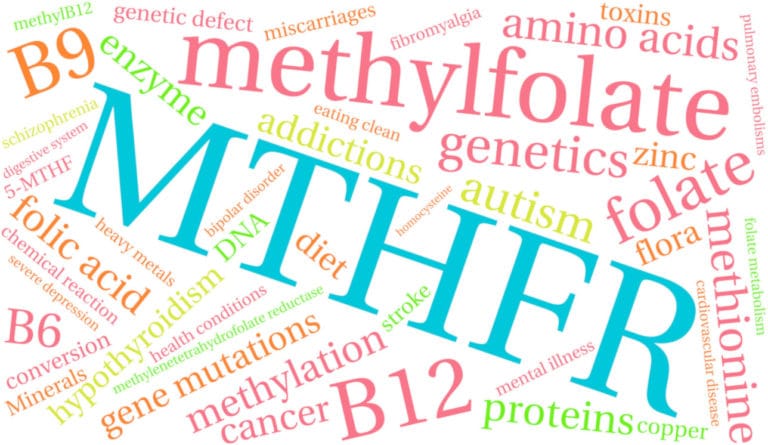Claudia is a 38-year old mother of two high-spirited young ladies. Her oldest child, Colette, received a diagnosis of Autism Spectrum Disorder when “Coco” was five years old. Recently, after visiting her integrative health physician, Claudia learned of something called a “MTHFR mutation.” Her physician strongly suggested Claudia be screened for this due to her history of multiple miscarriages and the fact that her oldest child was diagnosed with ASD. After scouring the internet, doing her own research, she decided to go ahead with testing. It turns out that Claudia is heterozygous for a C677T variant. Her doctor didn’t do a great job explaining EXACTLY what that means, so now she is left to wonder and worry that something is terribly wrong.
The MTHFR mutation gets a lot of press these days and you may be wondering if this is the source of many of the symptoms you are experiencing in perimenopause. Or you may already know that you have an alteration in one or more of your gene SNPs. The first thing I would encourage you to do is to relax. The goal of this blog post is to calm some of your anxieties, educate you about the genetic variant, and show you that “nurture is sometimes more important than nature.”
What is the MTHFR gene?
The inherited MTHFR gene mutation determines the way your body deals with (or detoxifies) environmental toxins, hormones, and adrenaline. The MTHFR gene codes for an enzyme known as “methylenetetrahydrofolate reductase” …or for short “MTHFR.” Besides being a fun acronym, what does that mean in plain English? Let’s take a trip back to science class.
[bctt tweet=”The inherited MTHFR gene mutation determines the way your body deals with (or detoxifies) environmental toxins, hormones, and adrenaline. #MTHFR #perimenopause #folate #homocysteine #epigenetics #C677T #A1298C #methylation #geneticvariants #SNPs #AnnaGarrettAsheville #DrAnnaGarrett” username=”DrAnnaGarrett”]
Genes are made up of DNA, which are the basic building blocks of life. You get one set of genes from each of your parents. A genetic enzyme reads and copies (or “transcribes”) the DNA. The 2 most common MTHFR variants are C677T and A1298C. The C677T variant is potentially very problematic if a person has two “A” copies of the gene. This can reduce methylation ability by up to 75%.
Of note, a genetic variant does not mean a problem will necessarily happen. Keep reading to find out more about this and how it relates to you personally.
Why is MTHFR Important in Perimenopause?
Genetic variations in the MTHFR gene (or “SNPs”) result in reduced activity of the enzyme produced and have been associated with a variety of inherited diseases, including pregnancy complications, ADHD/ASD, heart disease, some cancers, anxiety, depression, and neurological disorders.
The list is quite long- it would give anyone anxiety just reading it. Go here for a more robust explanation of MTHFR gene mutations and the diseases associated with them.
Again, correlation does not equal causation, but every Savvy Sister knows the best way to deal with fear is to fight it with facts. Knowledge is power, right? Which brings us to our next point.
What to Do If You Are Concerned
Most studies that have been done on the MTHFR gene mutation deal with homocysteine and folate (vitamin B-9) levels. The studies showed there was an increased risk of disease when homocysteine levels were too high, or folate levels were too low.
High homocysteine may indicate that you have difficulty with something called methylation or a vitamin B-12/folate deficiency caused by a MTHFR gene mutation and puts you at risk for clots or arterial damage.
Low folate results in low energy, “pins and needles” feelings, headaches, pale skin, and palpitations (among other things).
You can learn more about the signs of over and undermethylation here.
A healthcare professional trained in epigenomics can assist you with your concerns by
- Ordering a genetic test to determine if you have the MTHFR gene.
- Determining the levels of homocysteine in your blood.
- Helping you select the correct supplements of all B vitamins (folate, B12, and B6 needed to maintain healthy homocysteine levels.
I can help you with all of these things. Feel free to contact me at info@drannagarrett.com
Bottom Line
Despite the hype, it’s important to take these associations with a grain of salt until more robust studies investigate them further. If you have a genotype linked to low MTHFR activity and you’re concerned about any particular health condition, your healthcare provider can help you develop an appropriate strategy for prevention. Stay tuned for the second installment of calming MTHFR advice.
Dr. Anna Garrett is a menopause expert and Doctor of Pharmacy. She helps women who are struggling with symptoms of perimenopause and menopause find natural hormone balancing solutions so they can rock their mojo through midlife and beyond. Dr. Anna is the author of Perimenopause: The Savvy Sister’s Guide to Hormone Harmony. Order your copy at www.perimenopausebook.com.
Dr. Anna is available for 1-1 consultations. Find out more at www.drannagarrett.com/lets-




